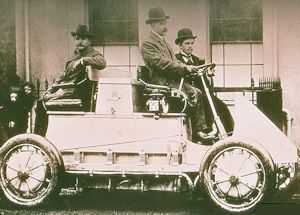The Porsche name first hit the headlines in 1900, when a groundbreaking new vehicle was unveiled at the World Exhibition in Paris. The 24-year-old Austrian-born engineer Ferdinand Porsche was already showing his brilliance, in this case with electric power.

- YEAR REVEALED 1899
- PLACE OF ORIGIN Vienna, Austria
- HISTORICAL STATUS production car
- ENGINE electric motors and also gas-electric hybrid
- MAXIMUM POWER unknown
- LAYOUT wheel-mounted electric motors driving the front wheels; rear-mounted engine powering electric motors in all wheels
- BODYWORK two-or four-seater open tourer
- TOP SPEED unknown
- NUMBER BUILT unknown
At the time, electric cars were just as popular as gas-fueled vehicles. The Lohner coachbuilding company of Vienna, a business favored by local nobility, decided to get involved. It had already built a handful of electric machines when Porsche joined the company and persuaded them to make his “Radnabenmotor.”
The vehicle did away with any kind of complicated transmission and bulky driveshaft by turning an electric motor into a wheel hub itself. With two of these at the front, the upright Lohner was a nimble front-wheel drive car. Porsche then created the Lohner Mixte-without doubt the world’s first hybrid car. The Mixte added a small gas engine, connected directly to an 80-volt dynamo.
This acted as an onboard generator; as it moved along, it produced electricity to power the wheel-mounted motors. However, in Porsche’s ultimate version of the car, a quartet of these electric wheel units gave a very early form of four-wheel drive. Any shortcomings that the car’s transmission might have had were probably not obvious on the poor road surfaces. As a surefooted device for negotiating mountain roads, it was little short of sensational.